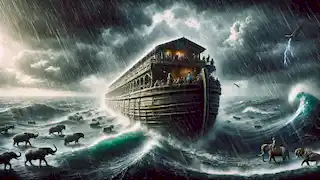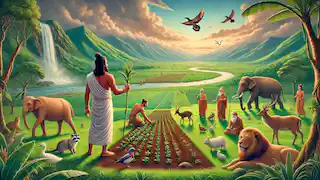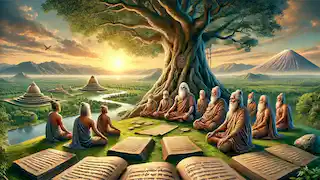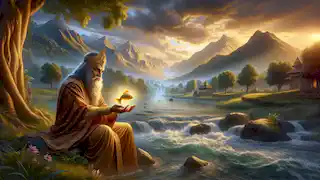In the sacred texts of India, there exists a legend that speaks of the origins of mankind, a tale of survival and rebirth after a great flood. This is the story of Manu, the first man, who, with the guidance of a divine fish, survived a devastating deluge that submerged the world. The tale of the Great Flood and Manu has been passed down through generations, embedded in the ancient scriptures of the Vedas and the Puranas. It is a story of faith, duty, and the divine intervention that safeguarded humanity. The legend not only highlights the bond between mankind and the gods but also serves as a reminder of the cycle of creation, destruction, and renewal.
This tale begins with the humble figure of Manu, a king, a sage, and the progenitor of the human race in Hindu mythology. As the story unfolds, it reveals the timeless themes of devotion, righteousness, and the omnipotence of cosmic forces, shaping the destiny of all living beings. Manu, the great and wise king, sat by the riverbank in deep meditation. His kingdom was prosperous, and his subjects lived in harmony with nature. Manu's wisdom was known far and wide, and the gods themselves favored him. Yet, despite all his achievements, Manu felt a stirring unease deep within his heart. The world, though thriving, seemed poised on the brink of an unimaginable transformation. One night, as he slept under the stars, Manu was visited by a vivid dream. In the dream, a vast ocean stretched across the earth, swallowing the land and every living thing. The rivers, lakes, and forests were submerged, and only darkness and water remained. Manu awoke in a cold sweat, the vision lingering in his mind like a haunting echo. He prayed to the gods for guidance, and his prayers were answered in a way he had never imagined. The very next morning, as Manu performed his daily ablutions by the river, he cupped his hands to draw water, only to find a small fish trapped in his palms. The fish was no ordinary creature; its scales shimmered like gold, and its eyes glowed with an otherworldly light. "Release me, O Manu," the fish said, speaking in a voice as clear as a bell. "If you protect me, I will protect you from a great disaster that will soon engulf the world." Manu, though surprised, was no stranger to the mysterious ways of the gods. Sensing the divine nature of the fish, he gently placed it in a jar filled with water. Over the coming days, the fish grew rapidly, so much so that Manu had to move it to larger containers, eventually releasing it into a lake. But even the lake could not contain the fish, and it finally asked to be set free in the ocean. Before returning to the sea, the fish revealed its true identity. "I am Matsya, an incarnation of Lord Vishnu. Soon, the earth will be engulfed in a great flood that will destroy all living things. You must build a great boat and take with you the seeds of all plants, one of each animal, and the Seven Great Sages. When the flood comes, I will guide you to safety." Manu bowed before the fish, realizing that this was the answer to his dream. The prophecy of the flood had been revealed to him, and it was his duty to prepare. Manu immediately set about building the boat as instructed by Matsya. He called upon the best craftsmen in his kingdom to aid in the construction, and soon a massive ark took shape—a vessel large enough to carry the seeds of the earth, the sages, and pairs of animals that would ensure the survival of life after the deluge. The ark was made of the finest wood, its beams sealed with pitch to make it waterproof. Its bow was shaped to cut through the waters, and it had a large deck that could accommodate all the passengers and the cargo. Manu also prepared provisions for the journey, for he did not know how long the flood would last. As the days passed, the sky began to change. Dark clouds gathered on the horizon, and the air became heavy with moisture. The animals, sensing the impending disaster, became restless. Birds flew low over the treetops, and the rivers swelled beyond their banks. But Manu remained calm, his faith in Matsya unwavering. On the day of the flood, Manu and the Seven Sages boarded the ark. They brought with them the seeds of all the plants, pairs of every animal, and the sacred Vedas—the ancient texts that held the knowledge of the universe. Manu's heart was heavy with sorrow for those who would be lost, but he knew that this was the will of the gods, a necessary step in the cosmic cycle of destruction and renewal. As the floodwaters began to rise, the ark lifted gently from the ground and floated on the surface of the swelling sea. Manu stood at the helm, looking out at the endless expanse of water that had swallowed the earth. The rains fell relentlessly, and the oceans surged with a force beyond imagination. Mountains disappeared beneath the waves, forests were uprooted, and rivers merged with the rising sea, becoming indistinguishable from the ocean. The world had been transformed into a single, boundless body of water. Inside the ark, the air was thick with tension. The animals, though safe, were agitated by the sounds of the storm outside. The sages sat in meditation, chanting hymns to calm the spirits and maintain their connection to the divine. Manu, too, prayed for guidance, knowing that the journey ahead would test his resolve and faith. For days, the ark drifted aimlessly across the water. The skies remained dark, and the only sounds were the howling winds and the crashing waves. Yet, through the storm, Manu saw a glimmer of hope—a shining light in the distance. As the light drew closer, he realized it was Matsya, the divine fish, swimming alongside the ark, guiding it through the turbulent waters. Matsya spoke to Manu in a voice that resonated with the power of the cosmos. "Fear not, for I will lead you to safety. When the time is right, the waters will recede, and the earth will be renewed. You must remain steadfast in your duty, for you are the father of the new world." With Matsya as their guide, the ark continued its journey across the endless sea. Though the storm raged on, Manu and his companions found comfort in the presence of the divine fish. They knew that as long as Matsya was with them, they would survive the flood and fulfill their sacred purpose. After many days, the rains finally ceased, and the waters began to recede. The ark came to rest on the top of the Himalayas, the highest peaks in the world. Manu and the sages stepped out onto dry land, their hearts filled with gratitude for the divine protection that had carried them through the flood. As they surveyed the land around them, they saw that the earth had been cleansed by the flood. The old world, with all its flaws and imperfections, was gone, and in its place was a new, fertile land, ready to be reborn. Manu released the animals from the ark, allowing them to roam freely and repopulate the earth. He planted the seeds he had brought with him, ensuring that life would flourish once more. The Seven Sages, who had preserved the sacred knowledge of the Vedas, began teaching the new generation of humans, passing down the wisdom that would guide them in their new world. Though the world had been destroyed, Manu knew that this was not the end but a new beginning. The flood had been a test of his faith and duty, and he had emerged victorious. He had fulfilled his role as the progenitor of the human race, and the gods had blessed him for his devotion and righteousness. The legend of the Great Flood and Manu is a story of survival, faith, and renewal. It reminds us that even in the face of overwhelming destruction, there is always hope for a new beginning. The cycle of creation and destruction is an essential part of the cosmic order, and through it, life is constantly renewed and regenerated. Manu, the first man, stands as a symbol of humanity's resilience and its enduring connection to the divine. His story continues to inspire generations, reminding us of the importance of duty, faith, and the eternal cycle of life. Manu's legacy lived on in the new world that emerged after the flood. He became the father of all mankind, and his descendants spread across the earth, creating new civilizations and cultures. The sages, too, played a crucial role in shaping the new world, guiding the people with their wisdom and knowledge. Over time, the story of the Great Flood and Manu became enshrined in the sacred texts of India. It was passed down through generations, a reminder of the power of the gods and the importance of faith in times of crisis. In the centuries that followed, the tale of Manu inspired countless myths and legends. His story was seen as a symbol of hope, a testament to the resilience of humanity in the face of adversity. Even in modern times, the story of Manu continues to resonate with people around the world, serving as a reminder of the enduring power of faith and the importance of maintaining our connection to the divine. The story of Manu and the Great Flood is not just a tale of survival but a reflection of the larger cosmic cycle of creation, destruction, and renewal. In Hindu cosmology, the universe undergoes cycles of birth, growth, decay, and destruction, only to be reborn once more. The flood that Manu survived was but one part of this eternal cycle, a necessary step in the process of renewal. As Manu's descendants spread across the earth, they carried with them the lessons of the flood. They understood that life is fragile and that the forces of nature, though destructive at times, are also essential for the continuation of life. The flood had washed away the old world, but it had also paved the way for a new one to take its place. Manu's story serves as a reminder that no matter how great the challenges we face, there is always hope for a new beginning. The floodwaters may rise, but with faith and perseverance, we can overcome even the most daunting obstacles and emerge stronger than before. In the end, Manu's tale is one of resilience, faith, and the enduring bond between humanity and the divine. His journey through the floodwaters, guided by the divine fish Matsya, is a testament to the power of devotion and the strength of the human spirit. Though the flood may have been a catastrophic event, it was also a catalyst for change, a necessary part of the cosmic cycle that allows life to renew itself. Manu's role in this process was crucial, and his story continues to inspire and guide those who seek to understand the deeper mysteries of the universe. The legacy of Manu lives on, not just in the mythological texts of ancient India, but in the hearts and minds of people around the world. His story reminds us that even in the darkest of times, there is always hope for a brighter future, and that through faith and perseverance, we can overcome any challenge that comes our way.Manu's Dream
The Ark of Manu

The Flood
The New World

The Legacy of Manu

A Cycle of Rebirth

Conclusion: Manu's Eternal Vigil

















